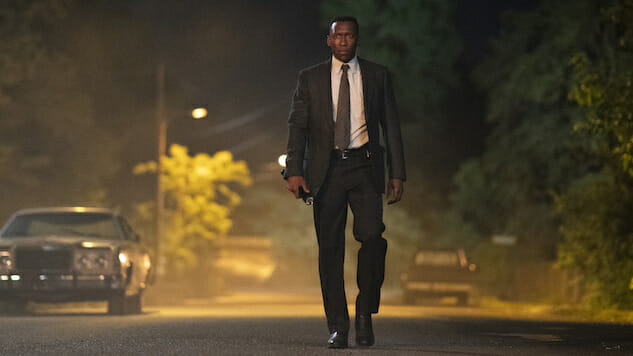True Detective: “Hunters in the Dark”
(Episode 3.06)
Photo: Warrick Page/HBO
There’s a thing some men say, men with certain kinds of psychological damage. They claim they have no bad memories—or no memories at all. Or that they are somehow making the mindful choice to exclude the past from consideration, since it cannot be redacted. It’s painful to live with a person who does this. I get the uneasy tone in Amelia’s (Carmen Ejogo) voice as she and Wayne (Mahershala Ali) share a cigarette in bed. What neither of them realizes is that Wayne’s past—this moment, perhaps—will indeed be subject to redaction, eventually. I wonder if we’d behave differently in our 30s if we could know for sure that by 65 we’d be unable to remember our children’s faces, or that we’d be slipping between worlds with no one to bring us back. Maybe we’d take a chance and be a little more vulnerable while we could choose that. Because the psychological damage stays, long after the faces and voices and times and places we loved are confused, tessellating ghosts.
In 1990, the attorney general is ready to indict Tom Purcell (Scoot McNairy) based on that phone call from the girl who seems to be Julie, and he pressures Wayne and Roland (Stephen Dorff) into “goading” Tom to confess. The detectives know Tom hasn’t hurt his kids—at least, I think they do. They’re pretty tough on him anyway. Maybe it’s performative; they’re being watched. Maybe they’re starting to question what they know. Maybe they don’t entirely trust their instincts anymore, or their memories. Either way, they can’t fail to notice they’re killing the guy. The other cops are ready to hang him. They send Wayne and Roland to the Purcell house.
In 2015, the documentarian is still interviewing Wayne, under the watchful eye of Henry (Ray Fisher). It’s starting to seem like Wayne might be using the dementia thing as an investigative tactic (his withholding observations from the AG in 1990 echoes this). Look, every defense mechanism in the world started out as an adaptive impulse. Denying you remember things is no different; it has uses.
Retreading old ground in 1990, Wayne and Roland do uncover a few things they didn’t know about Tom Purcell, like that he might have been gay. It’s enough to make Wayne think maybe Tom wasn’t the children’s father, which pisses Roland off. They both know they have to get it right after 1980, when Woodard was convicted posthumously on evidence they knew was fabricated and stretched because politicians wanted the community “to heal.” Unfortunately, there’s something weird going on with Harris James (Scott Shepherd), an ex-cop who might have planted Will’s backpack at Woodard’s house and who is now head of security for the chicken processing plant where Lucy Purcell (Mamie Gummer) worked. Something is going on with that guy.
-

-

-

-

-

-

-

-

-

-

-

-

-

-

-

-

-

-

-

-

-

-

-

-

-

-

-

-

-

-

-

-

-

-

-

-

-

-

-

-








































